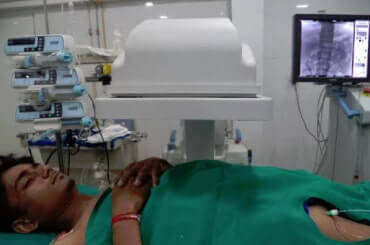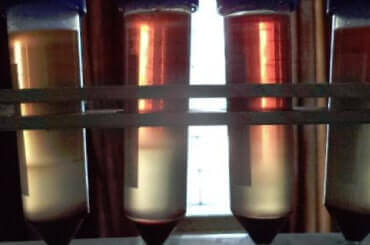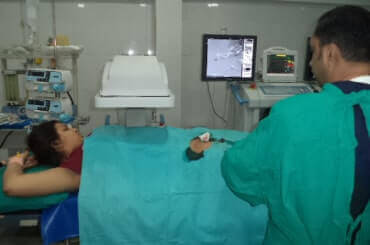Stem Cell Therapy Hospital in India
Dr. Jawale is a paediatric surgeon and has contributed to the development and inventions of therapies for the treatment of incurable diseases like Kidney Failure, Muscular Dystrophy, Diabetes, Diabetes Type 1 and Diabetes Type 2 and aims at improving the lifestyle of the patients.
Expertise and Precision
Since the inception, the Stem Cell Therapy India has been doing pioneering work in treating the genetic, degenerative and neurological disorders, a hope of a better future by revolutionizing the sphere of regenerative medicine. The ability to combine effortlessly to the new development in the medical field with the tried and tested abilities help the patients gain a potential life.
How Stem Cell Therapy India Help You?
Over the years of continuous analysis and research, sheer hard work and clinical trials, we have embarked on one of the finest method pursued with competitive doctors and medical experts giving you safer and non-toxic solutions with likelihood of healing. We have accelerated in treating patients coming from diverse places globally.
Success Rate Of The Stem Cell Therapy?
We walk by facts and do not make fake promises. When it comes to success rate of the therapy, it is about 50-60% for the patients. The success rate differs according to the severity of the ailment in addition to the type of treatment suggested for the same.
Contact Us
Stem Cell Therapy India - Treatments and Therapy

Diabetes Stem Cell Therapy
By providing affordable Diabetes Stem Cell Therapy Treatment India with international standard treatment facility we ensure you a happy and healthy life.

Diab. Type 1 Stem Cell Therapy
The cell based therapies at Stem Cell Therapy India is aimed at reducing the depletion of the cells and define a passage for the cells to normally function the insulin

Diab. Type 2 Stem Cell Therapy
It is a metabolic disorder caused by high blood sugar levels, lack of insulin and the hormone produced by pancreas to control the metabolism of sugar in the body.

Kidney Fail. Stem Cell Treatment
The Patients have shown Improvements with enhanced Creatinine level. The comprehensive success rate of Kidney failure Stem Cell Transplant is 65-75% approx.

Muscular D. Stem Cell Therapy
Currently there is no cure or Muscular Dystrophy but Muscular Dystrophy Stem Cell Treatment Therapy India is a ray of hope in regenerating the lost cells.
What is Stem Cell Therapy?
Regenerative medication or Stem Cell Therapy is quite possibly the most encouraging part of the advanced medication. Its fundamental target is to reestablish organ and tissue work for patients with consistent and even infections. Throughout the long term, researchers and surgeons have been utilizing Stem Cell Therapy to reestablish and fix tissues influenced by age, illness, and inherent imperfections.
Cells are the structure blocks of our body. They form various tissues and organs, and are accountable for various purposes in a multicellular body like our own, and begin from easier cells known as Stem cells.
Stem Cells are specific cells that can connect and fix harmed portions of our body. Stem Cells are currently viewed as a miracle of modern medication and have offered to another period of restorative systems like Stem Cell Therapy India. A variety of stem cells is being utilized from different sources or causes.
How Do Stem Cells Work?
Stem Cells are portrayed by exceptional and particular properties of self-restoration and separation into different cell types, and fill in as such an inner fix framework, partitioning basically without constraints to renew different cells. Undifferentiated organisms accomplish their reparative capacities through the accompanying components:
1. Delivering growth factors that have a corrective and regenerative impact on disabled tissue.
2. Making angiogenesis or boosting the supply of blood in harmed tissues thus helps in their interaction of fixing.
3. Forming into the tissue cells where they are infused, to change over the non-working cells into the working cells. And, Contact us for scheduling your appointment and get the best Stem Cell Therapy India at cost-effective price.
India has a vibrant stem cell treatment community built on an approach of gaining independency and exploring the comprehensive neuro re-habilitation. "Stem Cell is an origin of an organism's Life"
Stem Cell Therapy India - Expertise from Diverse Fields
The nuero-rehabilitation techniques adopted by us involves and strict and broad regime that is administered by the adroit belonging form diverse fields including physiotherapy, psychology, speech therapy etc.
Stem Cell Therapy India - Analysis Certificate
We make sure that the patient receives correct and necessary stem cell treatment based on the history and the condition he is suffering from. Our personalized and comprehensive treatment plans are defined by the recognized stem cells experts.
Stem Cell Therapy India - Latest Equipments and Technology
At Stem cell therapy India, there are some finest treatment options available with the state of art techniques backed by latest equipment and technology that plays an imperative role in high Quality and successful therapies.
Stem Cell Therapy India - World Class Facilities
With GMP grade compliant and world class facilities and technical expertise, we have been acknowledged for our speciality in stem cell treatment.
Utilizing the regenerative therapy like Stem Cell, we are aimed at providing successful solutions to the patients and contribute in enhancing their quality of life.
With millions of patients suffering from complicated medical conditions, stem cell therapy has emerged as the medicine of the future. This regenerative medicine is based on advanced technological and biomedical research and offers potential solutions for the prevention of cellular breakdown. The primary aim of this regenerative therapy is to improve the lifestyle of the patient and grant peace of mind.
Stem cells are basic cellular building blocks of the tissues and bodies found in the immune system and nervous system. They have this ability to function as regenerative cells like blood or nerve cells. The stem cells can repair or replace the damaged body cells and improve the health of the patient. If you have tried surgeries, physical therapies and other treatments and aren’t satisfied with the results, then maybe it’s time to explore new options and the future of medical science, i.e., Stem Cell Therapy India.
If that’s why you are here, we would be glad to offer insight into the stem cell therapy options and help you analyze how it can help improve the muscle’s mobility and lifestyle. As the leading stem cell therapy institution, we have helped several patients achieve promising results. For various medical conditions related to kidney, muscular dystrophy, you can consult us for knowing more about the Stem Cell Therapy India treatment.
What is the cost of stem cell therapy for Diabetes in India?
Well, To reach a certain cost requires a thorough study of various factors like patient medical history, age, level of seriousness, lifestyle, etc. And still one can not be sure that would be the exact amount. Every single person is different than others that is why a doctor can not follow the same procedure on every patient. To give
someone an amount without first having the aforementioned information is not aneducated decision. One can get a to-the-point idea of the issue by consulting aspecialized doctor in the field of stem cell therapy or by visiting fewhospitals nearby you. Treatment using stem cells was a new concept for Indialike a decade ago but now to find hospitals doing this treatment in like is apiece of cake.
If you live in Maharashtra and in, particular, Jalagaon district or nearby this district, you can get your patient’s condition analyzed in Gandhinagar’s Stem Cell Therapy India. An acquaintance of mine was visiting this place to get himself cured and he said that the total cost charged to him till discharge was around one lakh. But, His treatment happened two years ago, so, if you are looking for a health facility nearby or in general, you can check this place. It will ease off some of the mental stress which you would suffer from if you travel with your patient.

Why Choose Us
You can drop message for any querry.
Call us on
Stem Cell Therapy in India for Diabetes Type 1 and Type 2:
Stem cells are unspecialized cells that eventually mature into specialized cells that perform a specific function in our bodies.
Today, thanks to technological advancement and innovation, we can harness the potential of stem cells, also known as mother cells. At stem cell therapy India, we have all of the latest technology to isolate stem cells from the human body's bone marrow, concentrate them in a clean environment, and implant them back into the targeted or affected area, where they can colonize and adapt to the properties of resident stem cells and initiate the regeneration of some of the lost functions that have been compromised.
Stem Cell Therapy in India for Muscle Dystrophy:
Muscular Dystrophy is a set of hereditary disorders that, on progression, ultimately lead to muscle mass loss of skeletal muscles.
At stem cell therapy India, we utilize adult stem cells that are taken from the patient's bone marrow to treat Muscle Dystrophy. These cells are further colonized in a controlled environment at our specialized laboratory. Since these cells are obtained from the patient's own body, they're the safest, most unadulterated, and effective source of stem cells for your stem cell therapy.
Through our stem cell therapy in India, we have successfully brought improvements in the lives of thousands of Muscle Dystrophy affected patients. We have noticed signs of recovery in 95% of cases we have encountered within few months of our stem cell therapy. If you think your loved one is suffering from Muscle dystrophy then don't wait anymore, call +919370000380 to book your appointment for a consultation regarding stem cell therapy for Muscle Dystrophy.





